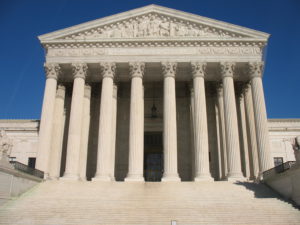Arizona Voter Case May Seriously Impact Tennessee Elections
- Posted by Dan
- On
- 0 Comments
The US Supreme Court decision on the Arizona voter case may impact Tennessee election authority by prohibiting enforcement of the requirement to be a US citizen before voting in Tennessee.
 On June 17, 2013 the US Supreme Court decided the case of Arizona, et al v. Inter Tribal Council of Arizona, Inc., et al. (You can download the complete Supreme Court opinion here.) In the Arizona Voter Case the Supreme Court ruled 7-2 against Arizona’s voter registration law that required proof of U.S. citizenship in order to register to vote. You may be interested to know that the law in dispute was passed in 2004 and was originally upheld in U.S. District Court, then struck down in the 9th Circuit Court of Appeals.
On June 17, 2013 the US Supreme Court decided the case of Arizona, et al v. Inter Tribal Council of Arizona, Inc., et al. (You can download the complete Supreme Court opinion here.) In the Arizona Voter Case the Supreme Court ruled 7-2 against Arizona’s voter registration law that required proof of U.S. citizenship in order to register to vote. You may be interested to know that the law in dispute was passed in 2004 and was originally upheld in U.S. District Court, then struck down in the 9th Circuit Court of Appeals.
Here’s why the Supreme Court decision may impact Tennessee elections: we have the same requirement i.e. that is you must be a U.S. citizen to register to vote. Is that too much to ask?
As is often the case, the Court decided the case on the narrowest of grounds. It did not completely knock out the law but simply said, you can’t enforce it until you properly present your request to the Federal Election Assistance Commission (“EAC”) that the “simple registration form” to be used for Federal Elections also include a requirement of proof of U.S. Citizenship. Now Arizona had asked the EAC to approve a modification of Arizona’s forms, however the EAC was “dead locked” 2 votes to 2 votes so it took no action. Rather than appealing the “non-decision” of the EAC, Arizona just announced it was going to enforce the law. That’s what caused the lawsuit to be filed.
Given that guidance (found on page 16 of a 51 page decision), Tennessee election officials could chose to petition the EAC to approve a modification of the form for use in Tennessee to require proof of U.S. citizenship. If the EAC fails to act, or denies Tennessee’s request (assuming it is made) then Tennessee could follow the course of appeal outlined in the Arizona opinion.
What is really going on here is a struggle between State’s rights and Federal power. The majority of the Court sided with the U.S. government (through the EAC) having the power to prescribe to the states a specific form that could not be modified without federal approval. I found the opinion pretty interesting as the Justices went all the way back to the Federalist Papers written by John Madison and Andrew Hamilton, reminding us of their “aversion to concentrated power.” Yet, then the Court made a finding that constitutionally, only the Federal Government can establish which forms a state may use in a Federal election.
There was also a passionate dissent written by Justices Clarence Thomas and Sam Alito who argued that the balance sought to be struck at the time of the framing of the constitution left the Federal government with the power to establish qualifications for so long as they were not different from those required by the specific states for their own state elections. Arizona has had a requirement of U.S. citizenship since 1912.
Justice Thomas wrote in opposition to the majority opinion:
I think that both the plain text and the history of the Voter Qualifications Clause, U. S. Const., Art. I, §2, cl. 1, and the Seventeenth Amendment authorize States to determine the qualifications of voters in federal elections, which necessarily includes the related power to determine whether those qualifications are satisfied.
To avoid substantial constitutional problems created by interpreting §1973gg–4(a)(1) to permit Congress to effectively countermand this authority, I would construe the law as only requiring Arizona to accept and use the form as part of its voter registration process, leaving the State free to request whatever additional information it determines is necessary to ensure that voters meet the qualifications it has the constitutional authority to establish.
Under this interpretation, Arizona did “accept and use” the federal form. Accordingly, there is no conflict between Ariz. Rev. Stat. Ann. §16–166(F) (WestCum. Supp. 2012) and §1973gg–4(a)(1) and, thus, no pre-emption.
If there is no “pre-emption” then the state of Arizona could use additional forms for registration that require proof of U.S. citizenship.
Most of us don’t pay much attention to this type of dispute because at least on its face it doesn’t impact our daily lives. Since we now live in a day when the IRS can impose additional requirements on a group if your political views are different that the party that holds the White House and the NSA can intercept over 1.5 million phone calls a day, perhaps the States Rights versus Federal Power is something that actually impacts our lives.
It’s something to consider anyway.
If you want to download the entire Arizona Voting Case Opinion you can do so here.


0 Comments